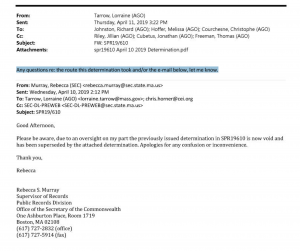Prospect of defending indefensible secrecy seems to have clarified OAG’s thinking
Climate Litigation Watch readers are no doubt familiar with the secrecy surrounding Michael Bloomberg’s program to place privately hired, activist “Special Assistant Attorneys General”. His vehicle created for the purpose is a “State Impact Center”, housed at New York University.
CLW has previously reported on the scheme’s operation in New Mexico, Maryland, and Minnesota where “SAAGs” are in place; in Virginia the initial irrational exuberance about participating — “to advance the agenda represented by” Bloomberg’s group, which AG Herring’s office actually wrote — quickly dissolved into denial in the face of public scrutiny and a legislative ban on accepting donor funds.
Several participants in the program attempted to shield from public view their applications to join from public. In litigation seeking an unredacted version Maryland’s AG Brian Frosh asked a court to seal his application to the Bloomberg Center — the only state to so hide its application. However, a close second for secrecy is the AG who followed Frosh as Bloomberg’s ringleader, Massachusetts Attorney General Maura Healey. Her office stonewalled the request, then slow-walked answering the appeal of that untenable denial.
The OAG then had a change of heart upon being sued, facing the prospect of defending the indefensible. Here is the background.
On February 5, 2019, the transparency group Energy Policy Advocates (EPA) submitted a request to Healey’s office requesting certain documents related to the State Impact Center, including the application, opinions on the ethics and legality (to which she had to attest in her application), and related correspondence. OAG replied to this request on February 22 by withholding every responsive record, claiming each and every one of them was exempt, in its entirety, from disclosure under one privilege or another.
This was implausible if representative of AG offices that far too often dare the public to sue in order to see what these offices are up to. Then a very curious chain of events began on March 1, 2019, when EPA appealed this response to the Supervisor of Public Records.
On March 15, the Supervisor ruled in EPA’s favor, ordering OAG to provide the records or an explanation why not within ten business days. On April 1, EPA requested an update from OAG on the status of this supplemental response; OAG ignored EPA, which again requested an update on April 15. On April 22, OAG replied that, well, the Supervisor had permitted it a 30 day extension.
This was the first EPA heard of any extension. It seems — as subsequent records requests whose — that OAG and the Supervisor of Records decided to keep oil close contact on this subject matter of EPA’s requests, which apparently troubled it.
The ex parte discussions between the AG and the Supervisor that afforded this extension raise real questions about fundamental fairness in the appellate process, a topic addressed in CLW’s “Hide the Opine” posts (those also relate to an even more extraordinary development, involving OAG’s relationship with the plaintiffs’ bar). The subsequent complaint lays out events, in which this gem of an email features:

In the end, the AG’s Office did not bother responding even given this 30-day extension, and on June 3, 2019, EPA filed a lawsuit to compel production. through its counsel, Government Accountability & Oversight, and local counsel Tim Cornell.
Apparently the prospect of defending these actions before a court caused the Attorney General of Massachusetts to think a little more clearly. After being served with suit over its dereliction, OAG reversed course and released 309 pages of responsive records previously withheld in full.
Some of these emails remain redacted; some of these redactions are doubtful enough that EPA is continuing its litigation.
But, what explains the sudden change of heart?
It could have been OAG’s shaky legal reasoning, exposure of ex parte communications between OAG and the Supervisor, and the terrible optics of bringing on two activist, donor-funded attorneys to work on issues of concern to the donor, making facially absurd blanket claims of exemption to each and every word of each and every record sought, and refusing to provide any insight into how such a decision was reached. Other than that, it’s difficult to say.
In the letter accompanying its production, OAG did indicate that EPA is simply too demanding of an organization.
MA OAG’s file of records that were too sensitive to release until sued is too large for a single upload and CLW will post these piecemeal in coming days.
